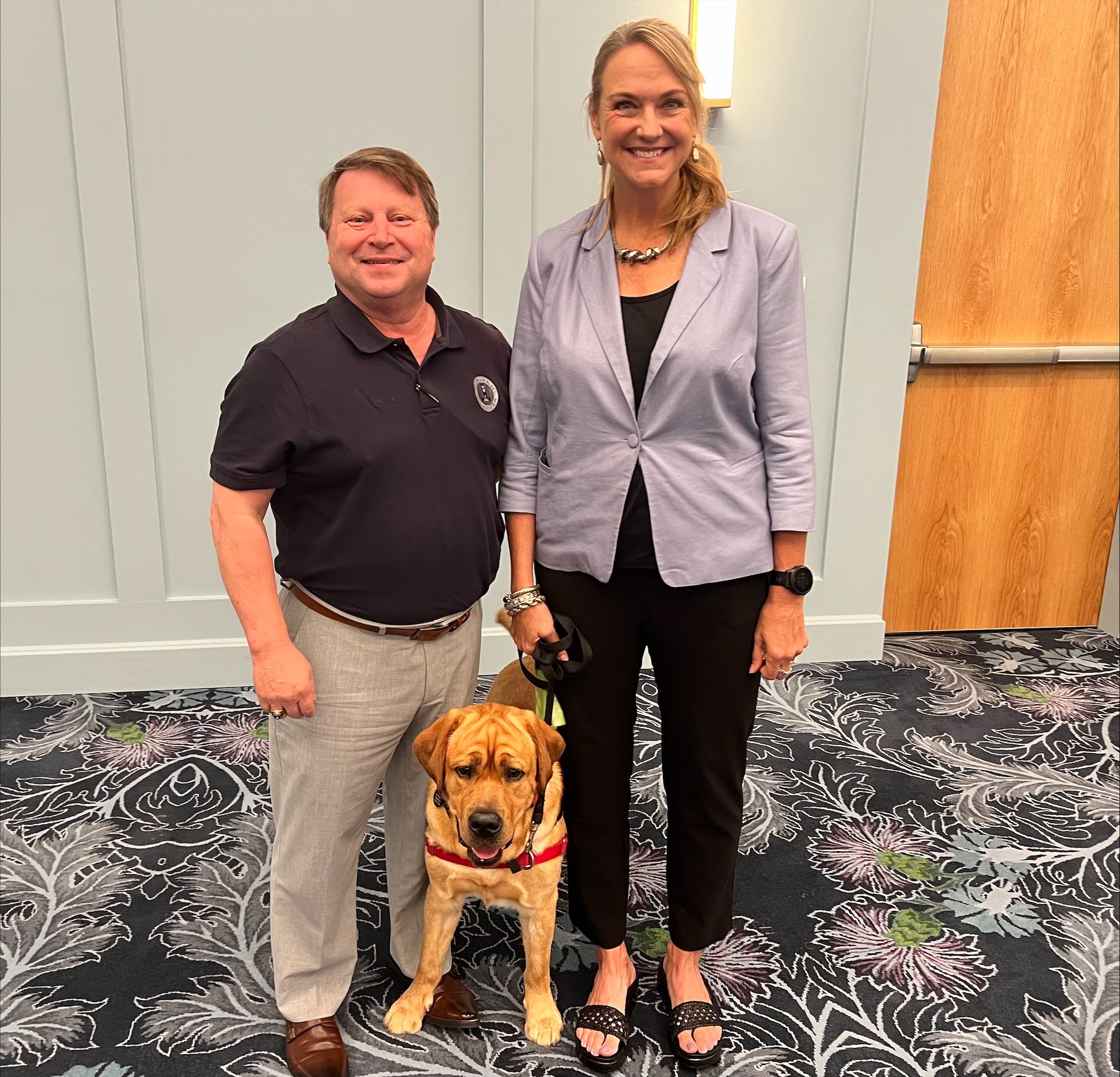Saint Francis Service Dogs: Enhancing Independence for People with Disabilities
The author with Bentley and Cabell Youell.
By Dr. David Cox
In a world increasingly dominated by technology and innovative approaches to fostering independence for individuals with disabilities, one traditional method remains both effective and popular: the use of service dogs. These highly trained animals provide invaluable support to their handlers, allowing them to achieve greater autonomy in daily life. As defined by the Americans with Disabilities Act (ADA), service dogs are considered working animals, not pets. They are rigorously trained in various disciplines to serve specific roles, such as guide dogs, hearing dogs, mobility assistance dogs, medical alert dogs, and psychiatric service dogs.
I recently had the opportunity to meet Cabell Youell, Executive Director of Saint Francis Service Dogs, and Bentley, one of their skilled service dogs in training, to learn more about their comprehensive program. Saint Francis Service Dogs, located in Roanoke, Virginia, has been dedicated to this mission since 1996 and is an accredited member of Assistance Dogs International. Their service area includes Virginia, western West Virginia, and northern North Carolina. Notably, Saint Francis Service Dogs operates entirely on donations without any governmental funding, and they provide their service dogs to recipients free of charge.
The organization is specifically focused on service dogs, which differs from guide dogs. As explained by Ms. Youell, guide dogs assist individuals who are blind or visually impaired, while service dogs are trained to perform tasks tailored to the specific needs of a person with a disability. At Saint Francis, the training programs are specialized to assist children and adults with a range of physical and developmental disabilities, including autism, cerebral palsy, joint and muscular diseases, multiple sclerosis, brain injury, paralysis, rheumatoid arthritis, and many other conditions. The service dogs are trained to perform actions that significantly enhance the quality of life for their handlers, enabling them to lead more independent and fulfilling lives.
“As explained by Ms. Youell, guide dogs assist individuals who are blind or visually impaired, while service dogs are trained to perform tasks tailored to the specific needs of a person with a disability.”
The training process at Saint Francis begins when the dogs are still puppies. Saint Francis breeds its own dogs, primarily Labrador Retrievers, which are known for their intelligence, temperament, and versatility. The training program spans a minimum of two years. In the early stages, puppies are placed in the homes of Volunteer Puppy Raisers, where they are nurtured and socialized. This phase is crucial for developing the dogs’ foundational skills and temperament. Inmates in a medium security prison participate in the initial phase of the puppies’ training as part of the Saint Francis Prison Pup Program. This partnership not only helps initiate the dogs’ training but also has a therapeutic effect on the inmates, providing them with a sense of purpose and emotional healing.
After approximately nine months to one year, the dogs transition into the advanced training phase. At this stage, professional trainers, who are highly skilled and passionate about their work, take over. Advanced training builds on the foundational lessons and focuses on teaching the dogs specific tasks that will be required in real-life situations. During this phase, the dogs learn more than forty commands and specialized skills, such as retrieving a medicine bag, assisting with laundry, positioning themselves to assist with wheelchair transfers, providing pressure therapy, and performing many other tasks tailored to the needs of their future handlers. A critical component of this phase is the matching process, where each dog is carefully matched with a candidate and their family based on compatibility and the specific needs of the individual. This matching process is essential because it lays the foundation for a lifelong partnership between the dog and its handler.
Ms. Youell shared several powerful testimonials from individuals who have received service dogs from Saint Francis. One recipient expressed, "I'm not facing challenges like before," while another stated, "I'm not alone anymore." These testimonies highlight the profound impact that a service dog can have on an individual's life. Ms. Youell explains that service dogs serve as a bridge to integration, helping people with disabilities connect more fully with their communities.
For more information about their services or to donate, please visit their website at www.saintfrancisdogs.org.
About the Author
Dr. David Cox is an assistant director of case management at The Orange Grove Center in Chattanooga, Tennessee. He is an accomplished business leader, instructor and speaker. David is a practitioner-scholar by applying practical application with scholarly knowledge. He holds a Doctorate in Higher Education Leadership and Organizational Studies (EdD) and Master of Business Administration (MBA). David has extensive experience in adult education, both in practical leadership roles, corporate trainer, and university professor. David’s has won several awards as a dynamic speaker and has also won awards in teaching higher education. His expertise extends beyond leadership to include A Gallup Certified Strengths Coach, an affiliated regional trainer in dementia for with intellectual disabilities, and as a Special Olympics volunteer for many years. David is committed to fostering leadership growth through strategic planning, effective communication, and innovative content creation. He serves on the board of directors for The Arc Tennessee and is active as a leader in the Ruritan National organization. Dr. Cox also has familial experience with IDD as his sister is also supported by The Orange Grove Center.


